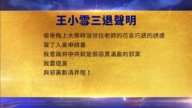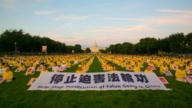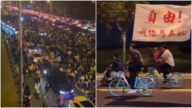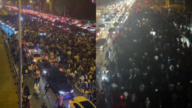【新唐人2013年12月02日訊】中共在十八屆三中全會後,高調對外宣佈將廢除臭名昭著的「勞教制度」。但越來越多的案例揭示,早已存在的所謂黑監獄、洗腦班、法制學習班等,正在成為勞教所的替代品。新近被曝光的一份政府秘密文件,就揭開了這背後的黑幕一角。
11月29號,大陸司法部副部長趙大程在國務院新聞辦公室舉行的記者會上表示,司法部已經起草了具體實施意見,將積極推進「社區矯正」的立法工作。而在此之前,中共十八屆三中全會後,已經決定「廢止勞教制度」,用「社區矯正制度」來替代。
據了解,中國的所謂「社區矯正」在2003年創建,2009年開始在全國試點,主要針對的對像是﹕處罰較輕的輕刑犯和短刑犯。
與「勞教制度」一樣,中國的「社區矯正制度」一直沒有相關法律依據。
時事評論員司馬泰:「現在三中全會以後,討論要搞一個社區矯正法,這樣就使得勞教制度廢除以後,它的替代品——社區矯正,可以有法律依據,擺脫當年勞教制度的尷尬。」
而大陸司法部副部長還在會上宣稱,「社區矯正」絕不會成為「變相勞教」。時事評論員司馬泰表示,在西方國家,「社區矯正制度」是針對吸毒、酗酒等被矯正對像的幫助,這些人自己也知道吸毒、酗酒是錯的,所以不存在變相處罰的問題。
司馬泰:「社區矯正從西方到了中國之後,有一個很大的問題,就是中共把矯正的對像擴大化了。對於良心犯、信仰犯、政治犯,對於這些人它要強迫進行『教育』的話,就變成了洗腦,就變成了強制『轉化』。所以它很容易就變成勞教。」
司馬泰認為,「社區矯正」是否會真的成為「變相勞教」,實際上取決於中共如何對待民眾,歸根結底還是中國有沒有信仰、集會自由的問題,也就是中共一黨專制的問題。
長期以來,中共為保政權穩定,對民眾進行嚴厲打壓。因此,針對上訪人員、思想異議人士的黑監獄、學習班遍佈全國各地,而法輪功學員被關進洗腦班、或精神病院等地被迫害的案例,更是比比皆是。
最近,網上曝光的一份政府秘密文件,就揭示了這背後的黑幕一角。
去年,中共十八大前夕,江蘇「常熟開關製造有限公司」的維權工人代表胡誠,因為到北京上訪,狀告企業董事會成員非法侵佔股權,而被當局抓進「法制學習班」。
11月15號,胡誠在「新浪微博」上公開了自己的遭遇和幾份政府公文。其中「常熟市處理信訪突出問題及群體性事件聯席會議辦公室」的一份文件指稱:胡誠在十八大期間「不聽勸導,執意進京上訪」。將他關進「法制學習班」符合當局的秘密文件——《關於依法處理進京上訪人員違法行為若干問題的意見》。
胡誠向江蘇省公安廳申請這份秘密文件的信息公開,竟被告知:文件信息屬於國家秘密,不予公開。
胡誠對《德國之聲》表示,「法制學習班」以秘密文件對公民進行秘密拘押,性質比勞動教養更惡劣。
此外,時事評論員林子旭分析指出,中共廢除勞教是迫於外界的壓力「不得已而為之」。而廢除勞教後,雖然有黑監獄等替代品,但這些迫害形式到目前為止,只能依靠地方財政撥款,缺少像勞教所那樣的大量資金支持。
時事評論員林子旭:「沒有錢的話,中共這些迫害民眾的機構就很難維繫。也就是說,雖然中共還會用很多方式繼續維持迫害,但是它的迫害力度必然會縮水。」
林子旭強調,目前中國民眾的反抗意識已經越來越強,此消彼長之下,中共未來的統治必然會變得越來越困難。
採訪/常春 編輯/李謙 後製/李智遠
Forced Labor, Community Corrections and “State Secrets”
After the Third Plenary Session of the 18th Central
Committee, the Chinese Communist Party’s (CCP) made
a high-profile announcement that the notorious
“reeducation through labor” system would be abolished.
However, many cases have revealed that the “black jails”,
brainwashing centers and “legal learning centers” that have
long existed have played the same role as labor camps.
Recently exposed secret government documents give
a glimpse of the enormous darkness in China.
On Nov. 29, the CCP’s Vice Minister of Justice
Zhao Dacheng attended the press conference held
by the State Council Information Office.
Zhao said the Ministry of Justice had finished a draft in
advising legislation of a new community corrections system.
Previously, the Third Plenary Session led to the decision
of abolishing the “Reeducation Through Labor” system
and replacing it with a “community corrections” system.
China’s so-called “community corrections” program
began in 2003.
In 2009, it began to conduct tests at select locations
all over China, mainly targeting minor crime offenders
serving short-term imprisonment.
However, just like the “reeducation through labor” system,
the “community correction” system has yet to be
supported by law.
Sima Tai, political commentator: “After the Third Plenum
there were discussions about legislation for
community corrections.
By doing this, after the labor camps are abolished,
they’ll have a legitimate foundation to substitute
them with community corrections centers.
This can get rid of the embarrassment of the previously
illegal forced labor system.”
The CCP’s Vice Minister of Justice also claimed that
“community corrections” will not become a disguised
“reeducation through labor” system.
Political commentator Sima Tai says similar community
corrections systems in western countries are designed
to help drug addicts or alcoholics correct their acts.
Those people clearly understand that taking drugs or
excessive drinking is bad so it has nothing to do
with any form of disguised punishment.
Sima Tai: ”After the community corrections system
was introduced into China a big problem has emerged.
That is, the CCP has expanded the target groups of
correction centers.
They do forcible ‘education’ on prisoners of conscience,
members of belief groups or political prisoners.
In such case ‘correction’ becomes ‘brainwashing’,
or ‘forcible mind conversion’.
Therefore it can easily work the same way as
the ‘reeducation through labor’ system.”
Sima Tai commented that, whether community correction
centers will become new labor camps depends on
the CCP’s attitude towards Chinese people.
Ultimately the problem is still that China has no freedom
of religion and assembly, which results from the CCP’s
one-party dictatorship.
Over the years, the CCP has used harsh crackdown against
Chinese civilians to maintain the “stability” of its regime.
As a result, black jails and “training centers” imprisoning
petitioners and dissidents can be seen across the country.
There are also numerous cases of Falun Gong practitioners
facing persecution via brainwashing centers or
psychiatric hospitals.
Recently, several secret government documents were
posted online, giving a glimpse of the enormous
darkness behind the curtain.
Last year, Hu Cheng, a workers’ rights activist representative
from Changshu City, Jiangsu Province,
went to Beijing to petition.
He charged the board members of his company, Changshu
Switchgear Manufacturing Co., for encroachment of equity.
However, Hu was later arrested and put into
a “legal education center”.
On Nov. 15, Hu Cheng posted his story and several
government documents on Sina Weibo.
One of the documents was issued by the “Changshu Joint
Session on Prominent Petition Cases and Mass Incidents”.
The file claimed that Hu Cheng refused “persuasion” and
insisted on petitioning in Beijing, therefore landing him in a
“legal education center” in line with a secret official document
named “Suggestions on lawfully dealing with
petitioners’ illegal acts in Beijing”.
Hu Cheng then requested the Provincial Public Security
Bureau to announce the information in that secret file.
Astonishingly, he was told that the file was a “state secret”
and would not be open to the public.
Hu told Deutsche Welle that using “legal education centers”
to secretly imprison citizens according to some document
that’s a “state secret” is even worse than the labor camps.
Political commentator Lin Zixu goes further, saying that
the CCP only “unwillingly" abolished labor camps
due to outside pressure.
On the other hand, although places such as black prisons
will continue to play similar roles after the abolishment
of labor camps,
till now they’ve only been financially supported by local
governments, and therefore lack sufficient funding sources
like labor camps.
Lin Zixu, political commentator: “Without money, the CCP
can hardly sustain its persecution of Chinese people.
In other words, although the party will try to sustain
persecution in different ways, it is not able to do that
at the same level."
Lin says that Chinese people now have a much
stronger sense for resisting against the party, and that
along with weakened suppression force, it will be harder
and harder for the CCP to maintain its governance in China.




























